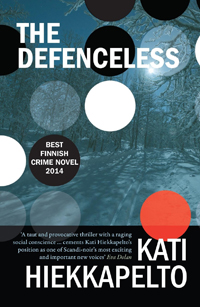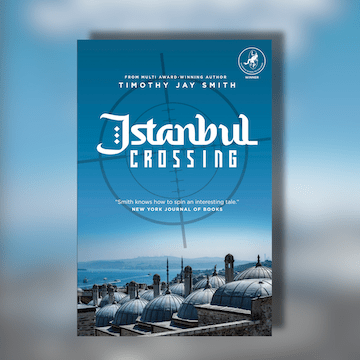
Translated by David Hackston — There’s a new school of social critique creeping into crime fiction. When it’s done without sacrificing either characterisation or a good plot, it can make for very compelling reading. After Stav Sherez and Eva Dolan in the UK, Arnaldur Indridason and Anne Holt in Scandinavia, we now have a Finnish author who is making this category her own.
We have previously reviewed The Hummingbird, the first novel by Hiekkapelto, featuring rookie detective Anna Fekete, a Croat of Hungarian origin who came to Finland as a child to escape the war in Yugoslavia. I am pleased to say that this second novel lives up to the promise of the first one and indeed surpasses it. The action takes place in a town in Northern Finland and, as in the previous book, we get a real feel for the place and the changing of the seasons.
The characters of the two main investigators, Anna and her ‘old dinosaur’ of a colleague Esko, are given more definition and depth. We see them both as more vulnerable and lonelier than in the first book. Although they would both fall under the sad, loner cop cliché, they do bring something extra to the role. Anna is unsure of where she belongs, torn between cultures, lonely but professing to like the non-interfering and aloof nature of the Finns. Like them, she doesn’t know any of her neighbours. Esko meanwhile tries to forget about his ex-wife and the pains in his chest, and dreams of escaping to a quiet, self-contained lifestyle in the woods.
They don’t have much time to be mournful, however, for they both have multiple cases to work upon. I don’t think I’m giving too much away when I tell you that the investigations are ultimately linked, although they don’t know this initially. A Hungarian au pair is accused of running over an elderly man with her car, although she claims he was already lying in the middle of the road. How did he get there, why was he in pyjamas and why has no one reported him missing? In a separate case, a blood-stained knife is found on a plot of land, with no victim in sight. It turns out the blood is human rather than animal. Meanwhile, a drug gang called the Black Cobras is prepared to use extreme violence to gain a foothold in Finland.
The most moving part of the novel is the story of Sammy, a refugee from the persecuted Christian minority in Pakistan, who has followed the same route into Europe as the heroin that’s smuggled in (of which he partakes). He applies for asylum in Finland but is turned down after two-and-a-half years, making this a very topical subject indeed. As he goes underground onto the streets to avoid deportation, he discovers a substitute to the heroin habit he had very nearly kicked. He becomes hooked on Subutex and gets involved with people he despises in order to feed his need. As you might expect, things turn very nasty and tragic indeed, despite Anna’s best efforts to help the boy.
In the course of the investigation, it becomes clear that Anna’s professed love of non-interference is merely theoretical. Her actions contradict her position: she fusses over her alcoholic brother, she tries to help Sammy to appeal his deportation, she yearns for connection with the Hungarian au pair, even though she is suspicious of her and tries to rebuff her.
There is a tremendous amount to like about this second volume of the series. I loved the nuanced depiction of the young heroine, the warts and all portrayal of her older partner, the detailed and realistic steps of a police investigation, plus the insight into the difficult life of an illegal alien. This is a series I will follow very closely.
The Kindle version of the book is out now, but the paperback follows in September. For more Scandinavian crime fiction click here.
Orenda Books
Print/Kindle/iBook
£5.69
CFL Rating: 5 Stars









